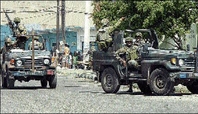What if Jamaica says no?
Published: Sunday | November 15, 2009

Joint police-military operation in Tivoli Gardens and Spanish Town Road on Sunday. - File
Talk of what the United States (US) might do if Jamaica fails to comply with the extradition request for Christopher 'Dudus' Coke is largely conjecture at this time.
But big countries - in particular the US - have many ways to put 'the squeeze' on smaller countries, and that is one reason why the justice ministry is likely, in the end, to sign the extradition request.
Punitive action by the US, if Jamaica refuses the request, would depend on whether any highly placed American personality cares about the case.
If a US Congress person's district has been touched by criminal violence with Jamaican connections, that person could make an issue of it, introducing a resolution condemning Jamaica's failure to act, or perhaps recommending sanctions.
The Barrack Obama-led White House could also recommend sanctions against Jamaica, but in the past, this has led to some backlash in public sentiment abroad, and seems unlikely, for now, in the Dudus case.
The US response may also depend on how important the issue is to its State Department, which is headed by former Senator Hillary Clinton.
If the US is seeking to strengthen declining influence in the region - or in Jamaica - that would make a real difference in its approach.
pressure
But perhaps the most likely action is that the State Department would bring attention and pressure to bear on Jamaica.
Many State Department officials have their favourite reporters and can quietly make their dissatisfaction known to the media. There has already been at least one story about Jamaica's slow response in the conservative Associated Press.
State Department advisories can also be used to 'hurt' Jamaica, especially if they remain in effect for a long time.
The US issues both longer-term 'warnings' and 'alerts' about countries and regions, and travel agents study these, as do travellers contemplating or heading off on vacations.
Many tourists already see Kingston as a 'no-go area', and any warning or alert involving the resort areas could hurt Jamaica's tourism.
The Obama administration has been slow to name an ambassador to Jamaica, and even though officials have denied that this is linked to the extradition request, the delay could be extended if the State Department is dissatisfied with the response to the Dudus case.
bargaining
The US Embassy in Kingston is a key foreign mission and the absence of an ambassador could stall business at various levels.
For its part, the Jamaican Government could request help from the US with the case, or even end up bargaining for such help.
If local officials fear a social explosion in the wake of an extradition, the Government could ask the US for anything, from police equipment to additional training for members of the security forces, and financial aid for social programmes.











